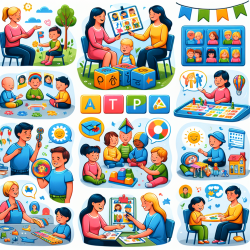Communication plays a pivotal role in the independence and quality of life of adults with intellectual disabilities. Despite the challenges, recent research suggests that with appropriate interventions, individuals in this demographic can significantly improve their communication skills. Drawing insights from the book "Communication Assessment and Intervention for Adults With Mental Retardation," edited by Stephen N. Calculator and Jan L. Bedrosian, this blog post aims to provide practitioners with valuable information on enhancing their therapeutic approaches and encouraging further exploration into this critical area.
The book underlines a critical shift in perspective required when working with adults as opposed to children with intellectual disabilities. It emphasizes the importance of adopting age-appropriate treatments and focusing on functional communication training to maximize independence in various social contexts. Such an approach not only respects the dignity of the individuals but also aligns with the principles of normalization and inclusion.
Here are several key takeaways and strategies that practitioners can implement to improve their skills and outcomes in therapy:
- Understanding the Unique Needs of Adults: Adults with intellectual disabilities have different needs than children. It's crucial to consider their life experiences, preferences, and aspirations when planning interventions. Tailoring communication goals to support their desire for independence in adult roles can lead to more meaningful and motivating therapy sessions.
- Functional Communication Training: The book highlights the importance of teaching skills that are directly applicable to everyday life. This includes using real-life situations as teaching moments and focusing on practical communication skills that can enhance social interactions, community involvement, and workplace integration.
- Comprehensive Assessment: A thorough assessment is the foundation of effective intervention. The book provides insights into modifying standardized tests and adopting a more holistic evaluation approach that considers the individual's communication needs within the context of their environment and daily life.
- Intervention Strategies: Several chapters offer strategies for working with adults at different levels of communication ability, from presymbolic to those with mild to moderate disabilities. These include using augmentative and alternative communication (AAC) devices, promoting spontaneous communication, and addressing the specific challenges faced by nonverbal adults.
- Encouraging Independence: One of the overarching themes of the book is the empowerment of adults with intellectual disabilities to take charge of their communication to the greatest extent possible. This involves teaching self-advocacy skills, enabling decision-making in therapy goals, and fostering independence through technology and support networks.
- Interdisciplinary Collaboration: The complexity of communication challenges in adults with intellectual disabilities often requires a team approach. Collaboration with other professionals, families, and the individuals themselves is crucial for developing and implementing effective interventions.
Implementing these strategies requires a commitment to continuous learning and adaptation of practices based on the latest research and evidence. "Communication Assessment and Intervention for Adults With Mental Retardation" serves as a valuable resource for practitioners seeking to expand their knowledge and improve their therapeutic approaches. The editors and contributors of this book have provided a comprehensive guide that challenges the traditional views on the capabilities of adults with intellectual disabilities and offers practical, evidence-based strategies for enhancing their communication skills.
In conclusion, this research and the strategies it presents underscore the importance of a person-centered approach in communication therapy for adults with intellectual disabilities. By focusing on functional skills, adopting appropriate assessment and intervention strategies, and fostering independence, practitioners can make a significant impact on the lives of these individuals. The book is a testament to the potential for growth and improvement in adult communication skills, challenging the misconception that learning stops at a certain age or developmental level.
For practitioners dedicated to improving the lives of adults with intellectual disabilities through enhanced communication, delving into this research is a step towards more effective, empowering, and inclusive therapy practices. To read the original research paper, please follow this link: Communication Assessment and Intervention for Adults with Mental Retardation.










